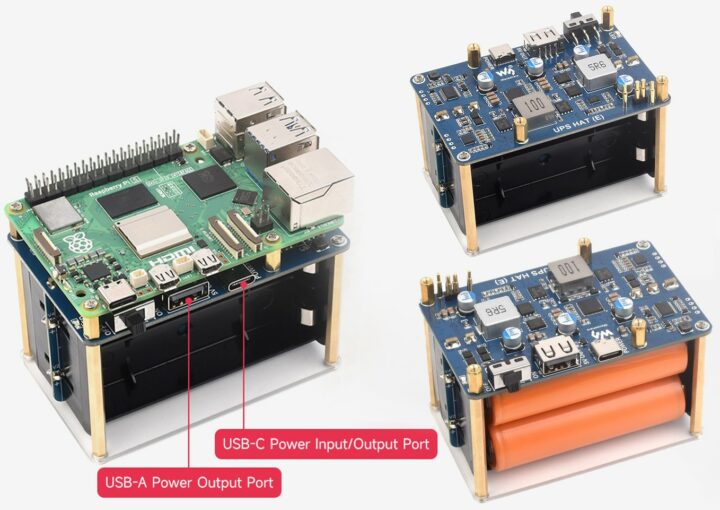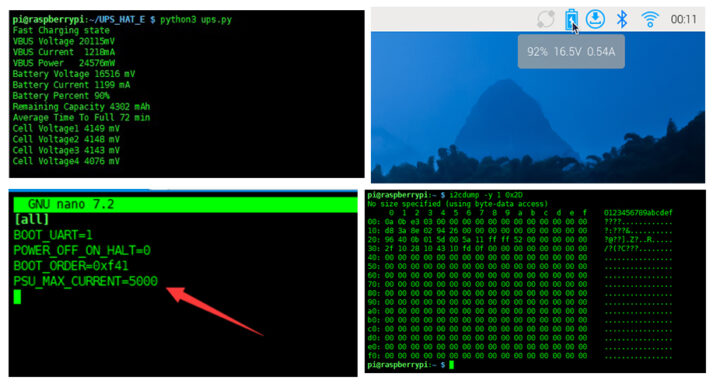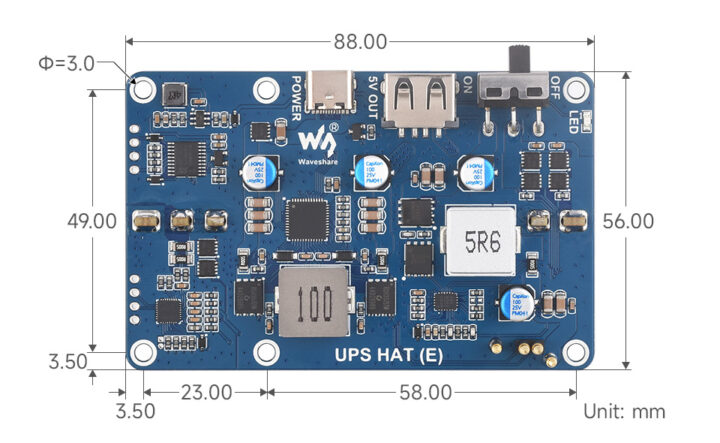The Waveshare UPS HAT (E) is a UPS expansion board for Raspberry Pi 5/4B/3B+ that supports four 21700 Lithium batteries and includes a battery fuel gauge IC for monitoring voltage, current, and capacity. The USB Type-C port is compliant with the PD 3.0 standard and allows for 40W fast bi-directional charging, and a high-power buck chip provides a 5V/6A output. Additionally, it supports I2C for real-time status updates.
Previously, we wrote about the wider SupTronics Raspberry Pi 5 UPS HAT, which supports four 18650 batteries and delivers up to 5V with a higher current output of 5A. This HAT has no Type-C support and uses a DC jack and XH2.54 connector for 6V-18V input. Feel free to check it out if you’re interested in this product.
Waveshare UPS HAT (E) specifications:
- Compatibility – Raspberry Pi 5 / 4B / 3B+
- USB Interfaces
- USB Type-C Input/Output – Supports multiple voltage levels (5V, 9V, 12V, 15V, 20V)
- USB Type-A Output – Provides 5V power for other boards
- Battery support – 4-cell 21700 Li-ion battery holder
- Battery Monitoring – Onboard battery fuel gauge IC for voltage, current, power, and remaining capacity
- Onboard ICs
- Battery Fuel Gauge IC – Measures voltage, current, and battery capacity
- High-Power Buck Chip – Ensures consistent 5V 6A output
- MCU Management – Detects power connection and manages Raspberry Pi booting
- Automatic Switch Over – Switches to battery power if the external supply fails
- LED Indicators
- Indicators for battery connection and charging status
- Warning alerts if the battery is incorrectly connected.
- Power Supply
- 5V/5A USB Type-C power supply recommended
- 2x pogo pin to power the Raspberry Pi
- Charging
- USB Type-C Port – Supports INA219 IC for bi-directional fast charging up to 40W, compatible with PD 3.0
- Simultaneous Operation – Can charge batteries and provide power output at the same time
- Dimensions – 88 x 56mm
The company shares a list of mostly generic safety instructions and warnings. Some of the most important points are
- Li-ion and Li-po batteries can be unstable; improper use can cause fire, injury, or damage.
- Do not reverse polarities when charging or discharging.
- Use only quality chargers to recharge batteries.
- Do not mix old and new batteries or use different brands of batteries together.
- Ensure battery specifications match the expansion board.
- Replace batteries after their cycle life ends or after two years of use.
To use the Waveshare UPS HAT (E) with Raspberry Pi, some Python commands enable the I2C interface, INA219 battery level detection, and battery level logo on the display. You can also set the required current to boot and adjust the booting time based on the power applied.
For more information about hardware and software, you can visit the product’s wiki page although the company does not provide specific hardware details such as IC part numbers or schematics.
The Waveshare UPS HAT (E) for Raspberry Pi is available for purchase on AliExpress for $37.47 including shipping, on Amazon for $44.99, and on the official Waveshare store for $32.99 plus shipping.

Sayantan Nandy, an electronics engineer with over four years of hands-on experience in PCB design, circuit development and power electronics, is proficient in EAGLE CAD, Ki-Cad, and Altium. He has a proven track record of delivering efficient and effective systems. His expertise extends from R&D, and prototyping to production support, making him a valuable asset to any engineering team.
Support CNX Software! Donate via cryptocurrencies, become a Patron on Patreon, or purchase goods on Amazon or Aliexpress








